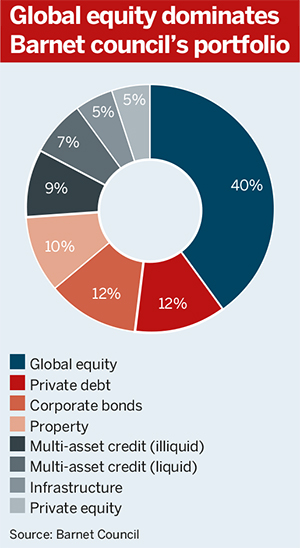The £1.1bn London Borough of Barnet Pension Fund has resolved to cut its 20 per cent allocation to diversified growth funds managed by Schroders and Newton Investment Management.
With this capital the fund will make new allocations to property and private equity of 10 per cent and 5 per cent respectively. It will increase its exposure to private debt to 12 per cent from 9 per cent.
Explaining the decision, a document distributed at a pension fund committee meeting on February 26 2018 cites a predicted uplift in performance, as modelled by consultant Hymans Robertson.
At the halfway point of 2016, £67bn of UK defined benefit assets were invested in DGFs, according to Spence Johnson analysis, with the majority of this placed in absolute return DGFs.
There was a tremendous amount of money flowing into private equity over the last year
Sven Smeets, Kempen Capital Management
Barnet aims to be fully funded in 20 years’ time. The model suggests the revised asset allocation would lift the probability of meeting this goal to 70 per cent from 66 per cent.
The changes would also yield an improvement, under a ‘worst 5 per cent of outcomes’ scenario, to a funding level of 44 per cent from 42 per cent.
The committee will meet to appoint a core UK property fund. Real estate consultancy CBRE is providing training to the fund on investment opportunities in property.
Investigate other types of DGFs
The Schroder Life Diversified Growth Fund delivered a net 8 per cent return during 2017. Meanwhile, the Newton Real Return Fund was placed on ‘watch’ in January by the London Collective Investment Vehicle over the “loss of key personnel” and a “regulatory breach”, according to an email sent to Barnet by the London CIV.
Both managers were invited to attend the committee meeting to discuss the strategy and performance of their respective DGFs, according to council documents. Both declined to comment on whether they accepted the invitation.

Patrick Cunningham, co-head of client management at fiduciary manager and investment consultancy Cardano, recognised a trend away from DGFs. He cited a common failure to deliver was down to return and to risk targets.
The Schroders and Newton DGFs can both be categorised as ‘asset allocator’ DGFs, he said. Asset allocator DGFs largely invest in equities, corporate bonds, government bonds and property.
They are typically long-only, and “tend to still be very heavy in equities”, Cunningham said.
He wants schemes to consider other variants of the asset class, such as relative value and risk parity DGFs.
“Before walking away from these strategies entirely, can they think about other types of diversified growth funds that offer more diversification?” Cunningham asked.
Chris Inman, DC investment principal at consultancy Aon, agreed that schemes are moving away from DGFs.
Schemes need to assess their objectives and select from the range of available DGFs accordingly. “Not all of them are built to give you equity-like returns,” he said.
Property is in short supply
Barnet could consider direct property ownership, along with multi-client funds or diversified funds of funds, according to the report.
It recommended that a property portfolio be comprised of a core element with “one or two funds that invest in traditional UK office, retail and industrial properties”.
This investment would be augmented by an allocation towards “satellite or non-core funds”.
David Wise, property investment director at asset manager Kames Capital, said an investor would need “at least £100m” to participate effectively in direct property investment.
A 10 per cent allocation to property from Barnet would equate to roughly £110m. The committee anticipates a lengthy time period for the completion of its property allocation.
Wise urged patience on the part of prospective property investors. “It’s not a market that is overburdened with stock to buy,” he said.
Consider smaller private equity managers
The fund has proposed postponing private equity investment, as well as a discussion on active emerging market equities, until later this year. The council declined to comment on the changes to its investment strategy.
Sven Smeets, co-head at asset manager Kempen Capital Management, emphasised the importance of taking a “hands-on approach” when engaging with private equity. Larger managers are less amenable to this, he said.
South Yorks plumps for alts as equity concerns bite
The South Yorkshire Pension Fund is trimming its equity exposure and allocating to a range of alternatives, as part of a wide-ranging review that reaffirms the fund’s commitment to environmental, social and governance-based principles.
Given the capacity constraints experienced by smaller private equity managers, he said it is “important is to know your managers fairly well, to have access to the smaller ones”.
Smeets noted a rise in demand for private markets. “Traditional markets have become more limited,” he said. “There was a tremendous amount of money flowing into private equity over the last year… 2017 was a record year,” Smeets added.

















